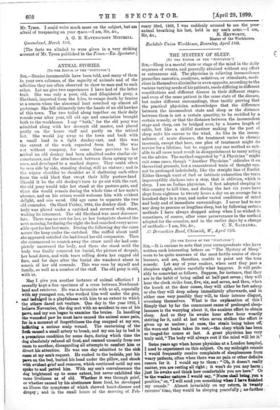ANIMAL STORIES.
[To THZ EDITOR OF THE "SPECTATOR.")
Sur,—Stories innumerable have been told, and many of them in your own columns, of the sagacity of animals and of the affection they are often observed to show to man and to each other. Let me give two experiences I have had of the latter trait. She was only a poor, old, and dilapidated pony, a Shetland, imported from the Isles, to escape death by famine at a season when the abnormal heat scorched up almost all pasturage. She fell ultimately into the hands of an old hawker of this town. The two toiled along together on their daily rounds year after year, till old age and emaciation brought both to the workhouse. I say "both," for the old pony was admitted along with her decrepit old master, and placed partly on the house staff and partly on the retired list. She would jog away to the town and back with a small load in a light donkey-cart, and this was the extent of the work expected from her. She was not without company, for some time previous to her arrival an old donkey had been admitted under similar cir- cumstances, and the attachment between them sprung up at once, and developed to a marked degree. They could often be seen side by side, standing dozing, still as statues ; and in the winter shoulder to shoulder as if sheltering each other from the cold blast that swept their hilly pasture-land Should it be the old donkey's turn to go out with the cart, the old pony Would take her stand at the pasture-gate, and there she would remain during the whole time of her mate's absence, and on his return would welcome him with evident delight, and vice versa. Old age came to separate the two old comrades. On Good Friday, 1894, the donkey died. The body was placed under a cartshed and covered with straw, waiting its interment. The old Shetland was most disconso- late. There was no rest for her, as her footprints showed the next morning, for during the night she had searched every acces- sible spot for her lost mate. During the following day she came acrosi the heap under the cartshed. She sniffed about until she appeared satisfied she had found her old companion. Then she cOnimenced to scratch away the straw until she had com- pletely uncovered the body, and there she stood until the body was finally removed for burial, the picture of despair, her head down, and with tears rolling down her rugged old farce, and for days after the burial she wandered about in search of her old comrade. This was seen by myself and family, as well as a number of the staff. The old pony is still with us.
May I give you another instance of animal affection I recently kept a fine specimen of a cross between Newfound- land and retriever. He was a favourite with us all, especially with my youngest son who worked him well under the gun, and indulged in a playfulness with him to an extent to which the others dared not venture. One day in the year 1882, I believe November' the dog met with an accident to one of his paws, and my son began to examine the bruise.. In handling the wounded pew he must have caused the animal some pain, for in a moment of forgetfulness the dog snapped at my son, inflicting a serious scalp wound. The cauterising of the fie& caused a small artery to break, and my son lay in bed in a precarious condition for some days, during which time the dog absolutely refused all food, and roamed uneasily from one room to another, disregarding all attempts to comfort him or divert his attention. He was one day admitted to the sick room at my son's request. He rushed to the bedside, put his paws on the bed, buried his head under the pillow, and shook with evident grief and remorse, which continued until my son spoke to and patted him. With my son's convalescence the dog brightened up to some extent, but never exhibited the, same liveliness as of old. Whether it was through grief, or whether caused by his abstinence from food, he developed an illness the symptoms of which showed heart-disease and dropsy ; and in the small hours of the morning of Feb- ruary 23rd, 1883, I was suddenly aroused to see the poor animal breathing his last, held in my son's arms.—I am, Master of the Workhouse. - Rochdale Union Workhouse, Dearnley, April 11th.






















































 Previous page
Previous page